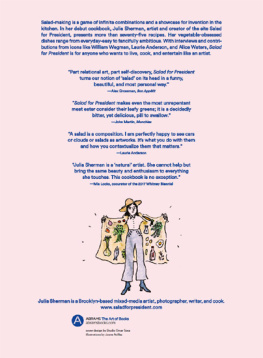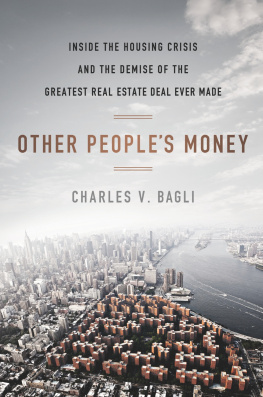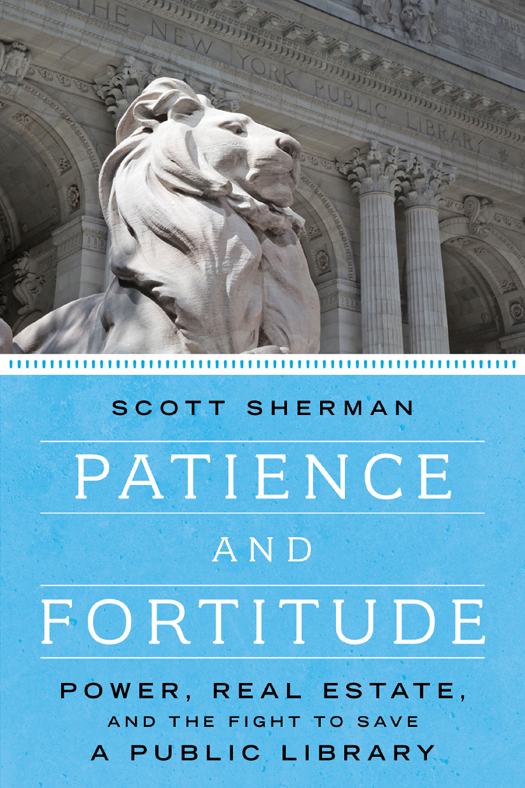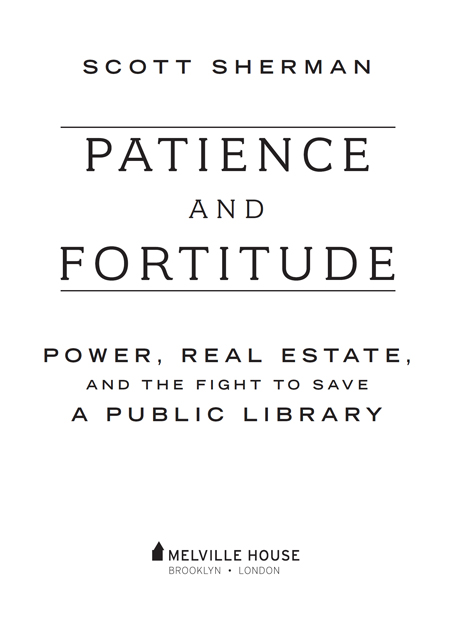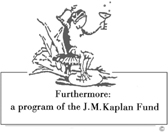Praise for PATIENCE AND FORTITUDE
With cool acuity, Scott Sherman details the insidious threat to one of the worlds greatest cultural institutions, and the gritty resistance that saved it. Anyone who cares about the future of books should read Patience and Fortitude.
PANKAJ MISHRA , author of From the Ruins of Empire
The battle over the New York Public Library was such an important fight to win, and Scott Shermans reporting was an essential part of that victory.
SALMAN RUSHDIE , author of Midnights Children
Its very hard to produce a specific, inarguable example of the power of the pressbut heres one. Scott Shermans pathbreaking 2011 article in The Nation about the New York Public Librarys plans to demolish much of its headquarters building and substantially change its purpose led directly to that misguided plans being abandoned three years later. Now Sherman lays out the entire story, from conception to cancellation, of the Central Library Plan. It is an absorbing narrative, and more; it also gets to the heart of an urgent broader issue, the danger our most precious institutions face in the age of disruption.
NICHOLAS LEMANN , author of The Big Test
Scott Shermans fast-paced story is a nuanced, disturbing account of what happens when the age of hedge funds, metrics, and management consultants meets one of our countrys great institutions of learning. Patience and Fortitude is all the more fascinating because Shermans journalism played a significant role in preventing a cultural atrocity.
ADAM HOCHSCHILD , author of King Leopolds Ghost
One can read Scott Shermans engrossing book as a critique of the New York Public Librarys stumbles, or as a love letter to a priceless institution. This is a love letter, and one that assails those the author believes would have violated the Librarys legacy. Even those who disagree with Sherman should tip their hats to him, for his passion and rigorous reporting, as this book reveals, has aided a great and priceless institution.
KEN AULETTA , author of Googled
When civic vandals masquerading as visionaries attempted to gut the New York Public Library, Scott Shermans intrepid reporting in The Nation shut them down. Now he gives us the full story, a riveting activist adventure yarn written with the elegance of a cultural romantic and the gimlet eye of an investigative journalist. What I learned is that a civilization traduces its librariesespecially this Libraryat its peril.
RICK PERLSTEIN , author of The Invisible Bridge
With reportorial doggedness, narrative lan, and an unfailing eye for the lancing detail, Scott Sherman masterfully tells the story, by turns enraging and heartening, of the plight of New Yorks most storied institution in an uncertain age.
TOM VANDERBILT , author of Traffic
Scott Shermans Patience and Fortitude is a gripping, meticulously reported account of the plan to gut a world-famous research libraryand the movement that sprung up to preserve it. Like Nicholson Bakers Double Fold, another provocative story about a debacle in the stacks, this riveting book shows just how bloody the fight over our cultural treasures can get.
MARILYN JOHNSON , author of This Book Is Overdue!
PATIENCE AND FORTITUDE
Copyright 2015 by Scott Sherman
First Melville House Printing: June 2015
Grateful acknowledgment is made to Brandon Stanton for permission to reprint his photograph on .
Portions of this book originally appeared, in substantially different form, in The Nation
Melville House Publishing
46 John Street
Brooklyn, NY 11201
and
8 Blackstock Mews
Islington
London N4 2BT
mhpbooks.com facebook.com/mhpbooks @melvillehouse
ISBN: 978-1-61219-429-5 (hardcover)
ISBN: 978-1-61219-430-1 (ebook)
A catalog record for this book is available from the Library of Congress
With thanks to the Furthermore grants in publishing, a program of the J. M. Kaplan Fund.
v3.1
TO BHARATI SADASIVAM
My library was dukedom large enough.
Shakespeare, The Tempest
CONTENTS
Preface
There Will Never Be an End to This Library
PREFACE:
THERE WILL NEVER BE
AN END TO THIS LIBRARY
This is a book about a world-class library that lost its way in the digital age.
In the late spring of 2011, Katrina vanden Heuvel, editor and publisher of The Nation, asked if I might be interested in writing a profile of Anthony Marx, the Amherst College president who had recently agreed to lead the New York Public Library (NYPL). Lots of unhappy rumblings about how oligarchson the Librarys board of trusteesare taking over too much of a major cultural institution as it celebrates its centennial, vanden Heuvel wrote. She envisioned a story about a clash of civilizations at the outpost of civilization.
The New York Public Library was an institution that mattered to me personally: as a writer, I had depended on the grand building on 42nd Street for twenty years, and had come to see how fully it embodied its nickname: the peoples library.
It was a place for both Shakespeare scholars and shoeshine boys. When the building turned seventy-five in 1986, Senator Daniel Patrick Moynihan, who had toiled as a bootblack in Times Square in the 1940s, recalled: It was the first time I was taught that I was welcome in a place of education and learning. I would go into that great marble palace, and I would check my shoeshine box. A gentleman in a brown cotton jacket would take it as if Id passed over an umbrella and a bowler hat.
I accepted the assignment, and soon reached out to a prominent academic librarian. Halfway through our conversation, he mentionedrather casuallythat the NYPL would soon remove the entire collection of books from the iron-and-steel stacks inside the 42nd Street building and send them to an offsite storage facility in Princeton, New Jersey. This was troubling news: the stacks three million books were the heart of the institution.
When I asked about this project, NYPL officials confirmed their intentions: the books would leave the building as part of a Central Library Plan (CLP), a wide-ranging reconfiguration of services, and the stacks would indeed be demolished. The CLP had been born in June 2007 and was announced to the public nine months later at a little-noticed press conference featuring the novelist (and NYPL trustee) Toni Morrison, who called the plan truly astonishing. The CLP aimed to consolidate three Midtown libraries into one colossal circulating library inside the 42nd Street building, which would undergo a $300 million renovation by Norman Foster, the British architect. (Frank Gehry had been on the shortlist for the job.)
The project was derailed by the recession of 2008. Fortuitously, I began my reporting as it was quietly being revived. My story, which appeared in The Nation in December 2011 under the headline Upheaval at The New York Public Library, launched a controversy that raged for two and a half years and resulted in more than forty stories in The New York Times






